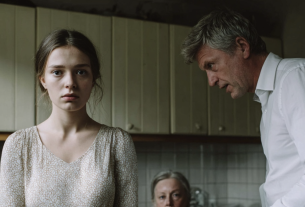Elena climbed to the fourth floor without an elevator, as always, and already on the landing she heard voices coming from the kitchen. Her mother and Katya were discussing something, speaking quietly but with that particular tone that meant: “an important conversation.” Elena stopped at the door and listened. No, they weren’t talking about her. Although… maybe they were.
“Lena’s here,” came Katya’s voice, the younger one. “I hear footsteps.”
Elena sighed and opened the door. The entryway smelled of borscht and something else—vanilla, probably; Katya had baked something sweet again. She always had time for baking.
“Hi,” Elena said, taking off her shoes. “What’s the meeting about?”
“Come join us,” her mother called. “Have dinner and we’ll talk.”
Elena walked into the kitchen. Her mother sat in her usual spot by the window, a cup of tea in front of her, already half empty. Katya had settled opposite, lounging carelessly against the back of her chair. On the table—plates, a pot, bread. Everything ready for a late dinner.
“Sit,” her mother nodded at the empty chair. “How are things at work?”
“Fine,” Elena poured herself some borscht and sat down. “We’re closing a project; they promised a bonus.”
“That’s good,” her mother smiled. “We were just thinking with Katya…”
Elena looked up. Katya was playing with her spoon, not looking at her sister. Her mother paused, as if choosing her words.
“We were thinking about the dacha,” she went on. “Grandma’s.”
“The dacha?” Elena was surprised. “What about it?”
“Nothing in particular. It’s just sitting there, a big lot, and we haven’t gone for years. The little house is old, already sagging. And we thought… maybe tear it down and build something new?”
Elena chewed slowly. They really had neglected the dacha after their grandmother died. The plot was in a good place, six sotkas in an old association, but the house needed serious repairs, and none of them had time.
“Tear it down and build what?” she asked.
“A house,” Katya said, finally lifting her eyes. “A proper house. Two stories. So there’s room for everyone.”
“Room?” Elena didn’t understand. “For what?”
Her mother sighed and set down her spoon.
“Lena, you’re not girls anymore. You’re thirty-one, Katya’s twenty-seven. It’s time to arrange your personal lives, start families. And how do you do that when the three of us live in one apartment? There’s not enough space, no privacy.”
“And what are you suggesting?”
“Katya and I will move out of the city into the new house,” her mother said. “And you’ll stay here. Your work is nearby—convenient. And I’ll transfer the apartment to you. You’ll end up with it anyway, so why wait?”
Elena put down her spoon. The idea was unexpected, but… rational. It was true that a three-room apartment was cramped for three adult women. And the plot was going to waste.
“And where will we get the money to build?” she asked.
“I have a little,” her mother said. “Savings. Not much, but enough for materials.”
“Maybe enough for materials, but the labor is expensive,” Elena noted. “Foundation, walls, roof, utilities… That’s serious money.”
“Could you…” her mother began and faltered.
“Take out a loan?” Elena guessed. “In my name?”
“Well, yes. You have a good salary, a clean record. And at my age they don’t give loans anymore.”
Elena thought it over. The logic was clear. She really did earn well, her credit history was impeccable. And the apartment in the center was valuable; they could even put it up as collateral if needed.
“How much, roughly?” she asked.
“We don’t know yet,” Katya admitted. “We need an estimate and to talk to contractors.”
“All right,” Elena said after a pause. “Let’s think about it. The idea’s interesting.”
Her mother beamed. Katya smiled too—sincerely for the first time in the conversation.
“Only everything has to be above board,” Elena added. “We agree in advance and we stick to the agreement.”
“Of course, of course,” her mother nodded eagerly. “We’re family.”
In the following weeks, they discussed plans almost every day. Elena went out to the plot, inspected the old house, and gauged the amount of work. At work, colleagues gave her contacts for reliable builders. One of them, Mikhail Petrovich, turned out to be a capable man—he drew up a detailed estimate, explained the technologies, and recommended materials.
“A turnkey frame house,” he said, flipping through his calculations. “Plus demolition of the old house and site prep. All in all, about five. But that’s quality work, with a warranty.”
Elena did the math: her mother’s savings covered about a third. The rest—credit. A big loan, but manageable. Especially if later she wouldn’t be paying for a rental and the utilities for her mother and sister.
“I agree,” she told Mikhail Petrovich. “When can you start?”
Construction began in March. Demolishing the old house turned out easier than Elena expected—after two days, nothing was left. Then they dug the foundation, set the frame, raised the walls. Elena came every weekend, monitored progress, and handled issues as they arose.
Her mother and Katya also showed up at the site now and then, but mostly to talk about interior design and room layouts. Katya had already chosen herself a bedroom on the second floor, with a view of the garden. Her mother wanted a room on the first floor—stairs were hard for her.
“And which room do you like?” Katya asked her sister.
“Me?” Elena was surprised. “I’ll be living in the apartment.”
“Oh right, I forgot,” Katya laughed. “You need the city—work, career.”
By autumn, the house was ready. Two stories, spacious, with big windows and a cozy veranda. Mikhail Petrovich handed over the project with pride—it really had turned out beautifully.
“You can move in,” he said, handing over the keys. “The heat’s running, hot water’s on, electricity connected. Settle in.”
Her mother and Katya moved in November. They gathered the essentials, loaded the car, and left. Elena helped with the move, hauled boxes, and cleaned the emptied rooms.
“Well, that’s that,” her mother said, looking around her new bedroom. “Now everyone has their own place.”
“And when will we re-register the apartment?” Elena asked.
“No rush,” her mother waved it off. “We’ll get settled first, then we’ll handle the paperwork.”
Elena didn’t insist. Truly, what difference did it make—today or in a month? The main thing was they had an agreement.
But a month passed, then another. Her mother and Katya settled into the new house, bought furniture, did more work. And they came to the apartment every few days—either for forgotten things or just to “check in.” And every time they changed something: moved furniture, took one thing, brought another.
“When are you moving out for good?” Elena asked on one of these visits.
“What do you mean, for good?” her mother didn’t understand. “We’ve already moved.”
“But half your things are still here. And you keep coming.”
“Well, it’s still our apartment for now,” Katya said, taking something out of the wardrobe. “Until the documents are re-registered.”
“Exactly,” Elena picked up. “So let’s get it re-registered.”
Her mother looked at her thoughtfully.
“What’s the rush?” she said. “We’re family. No need for extra formalities.”
“What formalities?” Elena felt the first twinge of unease. “We had an agreement.”
“We did, yes,” her mother conceded. “But life is unpredictable. What if Katya is the first to get married? Where would she and her husband live? It might get cramped in the house. And then you’ll move in with us so you don’t get in the young ones’ way.”
Elena stood there, unable to believe her ears.
“What do you mean?” she asked slowly.
“It’s very simple,” Katya said without even turning around. “Family circumstances change—plans change. No big deal.”
“But the house was built with my money!” Elena protested. “I took out the loan!”
“Well then keep paying it,” her mother shrugged. “No one’s saying you shouldn’t.”
“And the apartment?”
“What about the apartment? It was ours in common, and it stays that way. Why change anything?”
Elena sank onto the couch. Her head was spinning with indignation and hurt. So they had tricked her? Or had she just misunderstood?
“Mom, but we talked about this…”
“We talked about a lot of things,” her mother cut her off. “Now we look at the situation. Maybe we really will re-register at some point. Or maybe there won’t be any need.”
Elena left the room without a word. Katya caught up with her in the entryway.
“Don’t sulk,” the younger sister said with a condescending smile. “Why are you acting like a child? So the plans changed—big deal.”
“So you two get everything, and I pay the loan?” She realized her mother and sister had set her up completely, but she already knew how to teach them a lesson.
“So what?” Katya laughed. “At least now we have a beautiful house. And you’ve got a nice big apartment; you live alone. Lots of people dream of that.”
“I’m being serious, Katya.”
“So am I. Lena, you’re smart, successful. You’ve got a career, money. What’s so hard about paying off a loan? We’ll get the house sorted out, maybe I really will get married. Then we’ll see.”
“And if you don’t?”
“If I don’t, I don’t,” Katya shrugged. “Time will tell. Don’t be such a… such a loser and a doormat. You should be happy you helped family.”
Elena dressed slowly, fastening her jacket, tying her scarf. Katya stood nearby with the same condescending look on her face.
“A loser and a doormat,” Elena repeated quietly.
“Don’t be offended,” Katya waved it off. “I didn’t mean anything by it. You’re just a little too trusting sometimes.”
Elena walked out and shut the door. She went down the stairs thinking about those words. “A loser and a doormat.” Maybe she really was?
At home she sat down at the computer and opened the bank’s website. The loan account, the monthly payment, the remaining balance. The numbers were substantial. A couple more years of payments, if paid on schedule.
Elena closed the site and sat in the dark for a long time. Then she turned on the light, took out her phone, and wrote a message to her mother: “I’ve thought about our conversation. Let’s talk tomorrow.”
But the next day she changed her mind about calling. And the day after that as well. A week later a text came from the bank: “Your loan payment is overdue.”
Elena looked at the message and deleted it.
A month later the credit manager called.
“Elena Vladimirovna, you’re in arrears on your loan. When do you plan to make a payment?”
“I don’t,” Elena answered.
“What do you mean you don’t?” the manager was taken aback. “You have obligations to the bank.”
“I know,” she said, and hung up.
Another month later an official notice arrived: the bank was initiating collection proceedings. The house, for which the loan had been taken, was at risk.
Her mother called in the evening, her voice trembling.
“Lena, what’s going on? They called us from the bank—they say the house could be taken!”
“It could,” Elena agreed.
“How could it?! Why aren’t you paying the loan?”
“Why should I pay it?” Elena asked calmly. “The apartment isn’t mine, the house isn’t mine. What exactly am I paying for?”
“Lena, are you out of your mind?” her mother shouted. “This is our house!”
“Yours,” Elena corrected her. “You said it yourselves—family circumstances have changed.”
There was silence on the line. Then her mother spoke again, in a completely different tone:
“Lena, dear, let’s meet and talk calmly. Maybe we misunderstood each other.”
“You understood everything correctly,” Elena said. “We’re a family, like you said. Which means our problems are shared, too.”
“Lena…”
“Mom, if you want to keep the house—re-register the apartment. Tomorrow. If not, the bank will put the house and plot up for sale, and you’ll be left with nothing.”
Elena hung up and switched off her phone. For the first time in a long while, she felt at peace.
In the morning her phone wouldn’t stop ringing. Her mother, Katya, some unfamiliar numbers. Elena didn’t answer. At work she turned the phone back on—twenty-seven missed calls.
At lunch came a text from her mother: “Lena, come to the MFC at 15:00. We’re re-registering the apartment.”
Elena smiled and replied: “All right.”
At the MFC her mother was waiting by the information desk, pale and flustered. Katya stood beside her, not looking much better.
“Lena,” her mother began, “we’ve thought it over…”
“Thought it over well,” Elena interrupted. “Did you bring the documents?”
“We did,” her mother handed her a folder. “But you understand we’ll have nowhere to stay in the city now…”
“Stay at a hotel,” Elena suggested. “Or with friends.”
“Lena, don’t be cruel,” Katya pleaded. “We didn’t mean to…”
“Of course you didn’t,” Elena agreed. “It’s just that life is unpredictable, like Mom said.”
The re-registration process went quickly. Elena waited patiently while the documents were prepared. Her mother and Katya sat beside her, exchanging glances now and then.
“That’s all,” the MFC employee said, handing over the papers. “The apartment is now the property of Elena Vladimirovna.”
Elena put the documents in her bag.
“Thank you,” she said to her mother. “Now about the loan. I can’t cover it alone. Katya will have to get a job and help with the payments.”
“A job?” Katya gasped. “What kind of job?”
“Any job,” Elena replied. “You have a university degree, your arms and legs work. You’ll find something.”
“But I…”
“A loser and a doormat?” Elena finished for her. “That was about me, remember? Well, now you’re going to work. Otherwise the bank will take the house and you and Mom will be out on the street.”
Her mother grabbed Katya’s hand.
“Katya, darling, we’ll have to,” she said imploringly. “We didn’t expect Lena would go this far.”
“I’m ready to go much farther,” Elena noted. “So don’t test me.”
They left the MFC together, but already with different roles. Elena walked ahead, light and free. Her mother and Katya trailed behind, discussing where to look for work.
“Lena,” her mother called after her. “What about… what about us now?”
“What about you?” Elena turned. “You live in your house, you work, you help pay the loan. All fair.”
“But we’re family…”
“Of course we are,” Elena agreed. “Only now we’re a family with clear rules. We agree—then we follow through. Otherwise I might come up with something else unexpected.”
Her mother and Katya exchanged glances. There was no longer any condescension in the younger sister’s eyes—only bewilderment and something like respect.
“We understand,” her mother said quietly.
“Good that you do,” Elena nodded. “Because I was starting to think I really was a loser and a doormat.”
She got into her car and drove off. In the rearview mirror she saw her mother and Katya standing on the sidewalk, watching her go.
At home, Elena opened the bank’s website and paid the overdue amounts. Then she called the bank and asked them to recalculate the schedule to include two payers. The manager was surprised, but agreed.
That evening a text came from Katya: “Got a job as a manager at a trading company. The pay isn’t great, but it’s a start.”
Elena replied: “Good job.”
And a week later a crew of repairmen arrived—she could finally start on her apartment. Now truly hers.
Her mother and Katya stopped showing up unannounced. They called ahead, asked permission. They visited rarely and briefly. They were polite, but cautious—as if with a stranger whose capabilities they had not yet fully assessed.
And Elena did the renovations, planned a vacation, and thought about how sometimes being harsh means being fair. And that family is not an excuse for deceit, but a reason to be honest.
They paid off the loan together. Katya even got a promotion and a raise. And when the last payment was made, Elena threw a small celebration—bought a cake and invited her mother and sister over.
“Well, that’s that,” she said, cutting the cake. “Now the house is officially yours.”
“Thank you,” her mother said. “For everything.”
“You’re welcome,” Elena replied. “We’re family, after all.”



